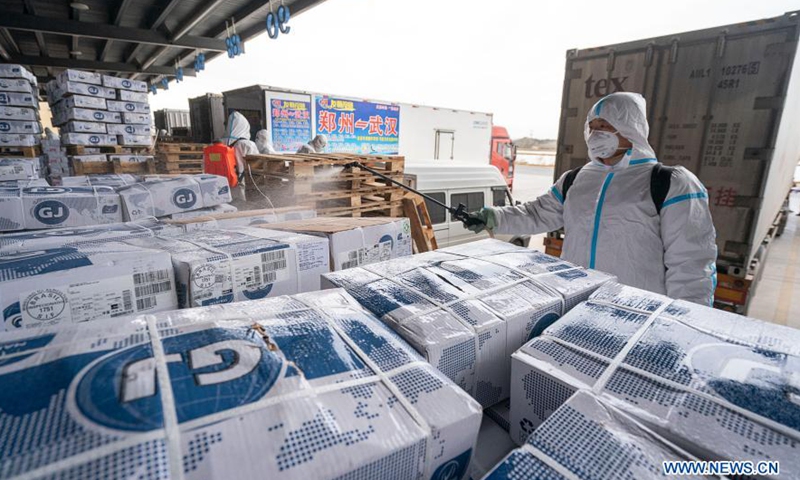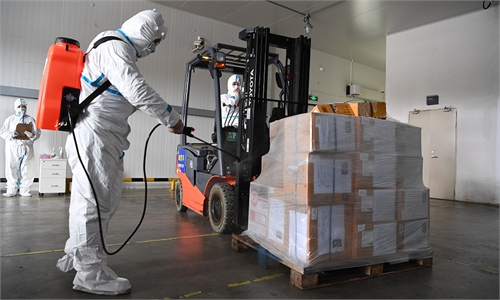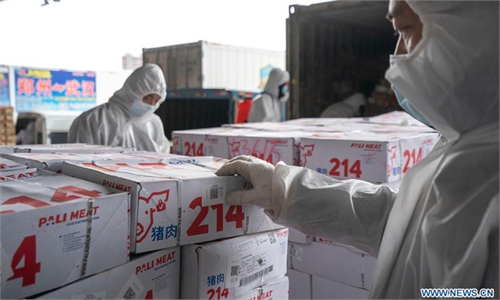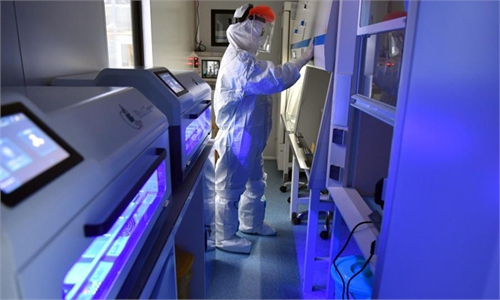
A staff member sprays disinfectant on the package of imported cold chain food at a regional cold chain center in Wuhan, capital of central China's Hubei Province, Jan. 7, 2021.Photo:Xinhua
Beijing is conducting nucleic acid testing among employees in key and "high-risk" industries including cold chain, farm markets, restaurants, food delivery, public transport and daily life services, as part of ramped up efforts to find asymptomatic and imported cases.
To fight the resurgence of coronavirus cases especially since December, Beijing has conducted large-scale nucleic acid tests to find potential virus carriers. As of Sunday, the city has conducted 17.46 million tests on its population with an average daily testing size of 415,680, Tian Tao, deputy head of Beijing's anti-epidemic work group in charge of testing, told a press conference on Monday.
Maximum daily testing capacity has reached 1.43 million, according to the official. Beijing has a permanent resident population of 21 million.
Beijing announced on Friday that it is organizing nucleic acid testing for over two million residents in the city's Dongcheng and Xicheng districts on Friday to Saturday. Residents said that the all-member testing campaign in these two core districts could serve as a prelude to a citywide nucleic acid testing campaign in the capital, especially as the Spring Festival holiday season approaches.
Constant testing has become a major approach for screening silent carriers of the virus, according to some Chinese experts, and others believe that sporadic cases in Beijing will not result in widespread transmission of the coronavirus, or be serious enough to require citywide testing.
The local authority is also conducting tests on workers from key industries on a weekly basis, and has so far conducted 3.5 million tests on the employees, finding one who tested positive.
The regular testing mechanism is necessary as those key industries face higher risks of contracting the virus, an expert close to China's Center for Disease Control and Prevention (CDC), who preferred not to be named, told the Global Times on Monday.
Workers in the cold-chain industry are exposed to more risks, as shown in the latest epidemiologist survey in Dalian, Northeast China's Liaoning Province.
As Spring Festival approaches, some local CDCs have also issued guidelines for those in the cold chain industry to protect themselves from being affected with the coronavirus, which is often found on the outer packaging of imported products. For example, Shanghai has been conducting seal-off management procedures for cold-chain products while conducting massive nucleic acid tests on the products, the local authority said on Sunday. As of Saturday, 32,733 boxes of food products have been tested since November 16, while seven batches of products have tested positive on their outer packaging for coronavirus, which were prevented from being sold.
Beside imported cherries, more imported food products, including red king crab from Chile, pork and ice cream have been found with the virus on their outer packaging. China's CDC deputy director Feng Zijian said in an earlier interview that when the temperature remains low during the winter and people travel, the logistics volume also increases. "We should remain cautious on cold-chain products contaminated by the virus, which will increase the risks for imported infections," he said.
All international freight by air, land and sea resemble cold-chain logistics as winter approaches, which means they could become carriers of COVID-19, Wu Zunyou, chief epidemiologist at China's CDC, told the Global Times in a previous interview.
China's Customs has also halted imports from 124 cold-chain food producers from 21 countries where COVID-19 cases were reported among their staff members as part of tightened prevention measures, according to the Chinese authority in mid-January.




